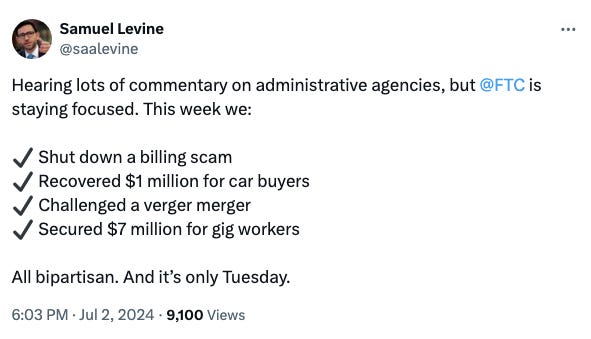But first, let’s talk about the Political Twilight Zone, which I’m naming after the science fiction TV show in which characters would experience disturbing, unusual, or paradoxical events, often funny and always creepy. Learning about these alternative worlds where the rules applied in dark and unexpected ways meant you were ‘entering the Twilight Zone.’
So what is this Twilight Zone? Well we’re used to a world where our leaders are functional and healthy, if not always honest or competent. And yet, the most important man in America, President Joe Biden, is clearly not well, which we all saw on national TV last week. This dynamic is especially weird because there’s a public debate in which a large faction of Democratic elected leaders are pretending that he is well. It feels Soviet, or Twilight Zone-ish. (...)
Life Goes On
Despite these events, at least the Federal Trade Commission is continuing to govern, with four bipartisan actions on consumer protections and competition this week. Here’s the FTC’s head of consumer protection, Sam Levine, making that point.
It’s telling that in one of the few parts of government run by younger decision-makers - all five commissioners are in their 30s - things actually happen. The most important of these actions is a challenge to a $4 billion merger of the world’s largest mattress maker, Tempur Sealy, and the nation’s biggest mattress retailer, Mattress Firm. (Levine means vertical merger not ‘verger merger,’ he later clarified he’s too busy protecting consumers to spell-check.)
What is this merger challenge and why does it matter? Well most of the big important monopolies we’re dealing with, from Google to Ticketmaster, are vertically integrated, which is to say, they own a bunch of different parts of a supply chain or ecosystem. Google runs search, but it also controls app stores, YouTube, adtech systems, Maps, and email, which it rolled up systemically through acquisitions over decades.
The reason it could do this is because for more than 40 years, the FTC didn’t challenge a single vertical merger, focusing only on the deals where a rival is buying a rival, instead of deals where a supplier is buying a customer. Libertarian economists argued that, unlike a rival buying a rival, such ‘vertical’ mergers helped reduce overhead and increase efficiency in the economy.
But that thinking is, of course, dumb, and has changed significantly. As antitrust lawyer and former FTC enforcer John Newman noted, this dynamic started to shift in 2021 under then-acting Chair Rebecca Slaughter with Illumina/Grail, and then continued with a bunch of different merger challenges, such as “Nvidia/Arm, Lockheed/Aerojet, Microsoft/Activision, and now Tempur Sealy/Mattress Firm.” And another, IQVIA, was challenged partly as a vertical merger, and the FTC won that case.
This refusal to challenge vertical mergers was an enforcement decision in the 1980s to ignore Congress, as the last update to anti-merger law was written in 1950 in part so that vertical mergers could be challenged. This Tempur Sealy case had all five commissioners in support, including the two new Republicans, Andrew Ferguson and Melissa Holyoak. It’s a very different FTC than it was just a few years ago. In terms of durability of the anti-monopoly agenda, this change seems like it’ll last. (...)
So there we go. It’s easy to discount such a move, since mattresses don’t seem to be a big deal, and we’ve become inured to these regular challenges of multi-billion dollar deals. But having a unanimous vote to challenge a multi-billion dollar vertical merger would have been unthinkable in 2019. Today, it’s so routine it’s unnoticeable.
That’s one item the FTC is pursuing. But it’s not the only one.
There’s also the commission’s bipartisan campaign against the high cost of inhalers and epipen-style injectors, old products priced at hundreds of dollars apiece in the U.S. that cost very little abroad. It’s a complex story, but one reason for the high price is that medical companies misuse their patents, particularly when medicine is delivered through a device, like an auto-injector or inhaler. Firms will make a minor tweak to a device, and then illegally claim more patent protection, allowing the firm to keep rivals off the shelf and maintain high prices.
In April, the FTC targeted 300 of these “junk patents” for a variety of medicines. The pharmaceuticals targeted were “diabetes, weight loss, asthma, and COPD drugs, including Novo Nordisk Inc.’s blockbuster weight-loss drug, Ozempic.” To add to that, yesterday, the FTC sent out subpoenas to Teva Pharmaceuticals for internal documents relating to “about two dozen patents for its asthma and COPD inhalers.” (...) [ed. see also: How The Jetson's Lost to Black Mirror]
But get ready. The FTC was created in 1914, long before the New Deal-era precedents that the Supreme Court is attacking. So it’s been mostly exempt from the litigation drama. But I think it’s fairly likely that a court tomorrow strikes down the FTC’s rule-writing authority, starting with the ban on non-competes that it finalized in April. [ed. It didn't, but the decision isn't final yet and the reasoning is murky]. I don’t know exactly what the judge will say or do. I’m not 100% certain it’ll be bad news, as the Fifth Circuit did shockingly uphold the Illumina-Grail challenge. But it could, and likely will, get ugly. And if it does, the response will be to build political support among the public to stop monopolization. Which, come to think of it, is exactly what anti-monopolists should do, Twilight Zone or no.
by Matt Stollar, BIG | Read more:
Image: The Twilight Zone
[ed. Lina Khan, Chairman of the FTC, is like a breath of fresh air. Too bad she'll be gone in two seconds or less if a Republican administration is elected. See also: FTC Non-Compete Ban Survives a Texas Court, For Now (BIG).]

